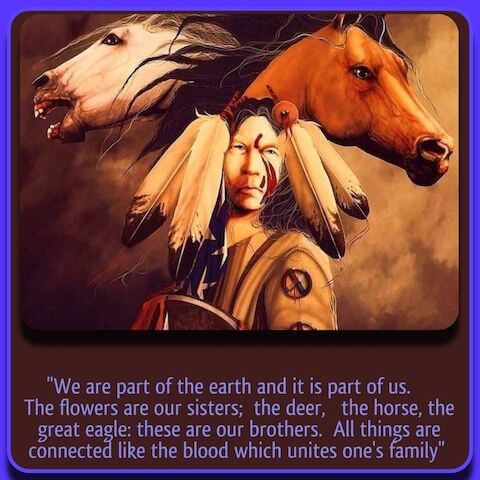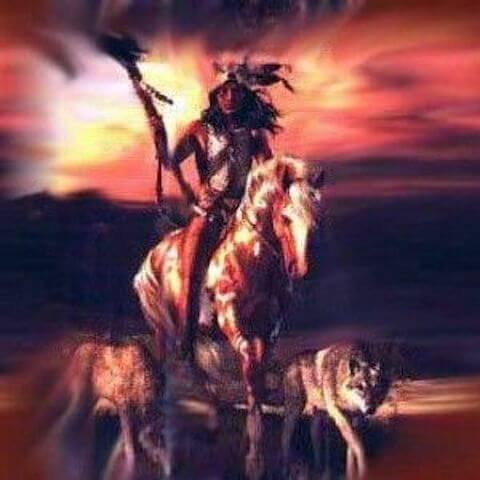To view this page in another language, please click here:
Other Languages
Water Spirit's Gift of Horses
In the days before horses a poor orphan boy lived among the Blackfoot. Because he was so poor he knew that he could never obtain the things he wanted without the secret power of the gods. One day he left his camp to seek a vision that would tell him what he must do. He slept alone on a high mountain, he prayed near some great rocks, he fasted beside a river, but no vision came to him, no voice spoke to him. He travelled beyond the Sweetgrass Hills to a large lake, and because no sign of any kind had come to him he bowed down and wept.
In that lake lived a powerful Water Spirit, a very old man, and he heard the crying of the poor orphan boy. The Water Spirit sent his young son to find the boy and ask why he was crying. The son went to the weeping boy and told him that his father who lived in the lake wished to see him.
"But how can I go to him if he lives under the lake?" the poor boy asked.
"Hold on to my shoulders and close your eyes," replied the Water Spirit's son. "Don't look until I tell you to do so."
They started into the water. As they moved along, the Water Spirit's son said to the boy: "My father will offer you your choice of the animals in this lake. When he does so, be sure to choose the oldest mallard of the ducks and all its young ones."
As soon as they reached the underwater lodge of the Water Spirit, the son told the boy to open his eyes. He did so, and found himself standing before an old man with long white hair. "Sit beside me," the Water Spirit said, and then asked: "My boy, why do you come to this lake crying?"
"I am a poor orphan," the boy replied. "I left my camp to search for secret powers so that I may be able to make my way in the world."
"Perhaps I can help you," the Water Spirit said. "You have seen all the animals in this lake. They are mine to give to whom I wish. What is your choice?"
Remembering the advice of the Water Spirit's son, the boy replied: "I should thank you for the oldest mallard of the ducks and all its young ones."
"Don't take that one," the Water Spirit said, shaking his head. "It is old and of no value."
But the boy insisted. Four times he asked for the mallard, and then the Water Spirit smiled and said: "You are a wise young man. When you leave my lodge my son will take you to the edge of the lake. After it is dark he will catch the mallard for you. But when you leave the lake don't look back."
The boy did as he was told. The Water Spirit's son gathered some marsh grass from the edge of the lake and braided it into a rope. With this rope he caught the old mallard and led it ashore. He placed the rope in the boy's hand and told him to walk on, but not to look back until sunrise. As the boy walked on toward his camp in the darkness, he heard the duck's feathers flapping on the ground. Later he could no longer hear that sound. Instead he heard the sound of heavy feet pounding on the earth behind him, and from time to time the strange cry of an animal. The braided marsh grass turned into a rawhide rope in his hand. But he did not look back until dawn.
At daybreak he turned around and saw a strange animal at the end of the rope, a horse. A voice told him to mount the animal and he did so, using the rawhide rope as a bridle. By the time he reached camp, he saw many other horses following him.
The people of the camp were frightened by these strange animals, but the boy told them to have no fear. He dismounted and gave everybody horses from the herd that had followed him. There were plenty for everyone, and he had a large number left over for himself.
Until that time, the people had only dogs for carrying their packs and dragging their travois. The boy now showed them how to use the horses for packing, how to break them for riding, and he also gave the horse its Blackfoot name, elk dog. One day the men asked him: "These elk dogs, would they be of any use in hunting buffalo?"
"Yes, let me show you," the boy replied, and as soon as they were mounted he led them out to a buffalo herd where he showed them how to chase buffalo on horseback. He also showed them how to make bridles, saddles, hackamores, whips and other gear for their horses. Once when they came to a river, the men asked him: "These elk dogs, are they of any use to us in water?"
He replied: "That is where they are best. I got them from the water." And he showed them how to use horses in crossing streams.
When the boy grew older, his people made him a chief, and since that time every Blackfoot chief has owned many horses.
When did the horse get to America?
The Horse in Blackfoot Indian Culture
Bureau of American Ethnology Bulletin
![]() Return to Indigenous Peoples' Literature
Return to Indigenous Peoples' Literature
Compiled by: Glenn Welker
ghwelker@gmx.com
This site has been accessed 10,000,000 times since February 8, 1996.

